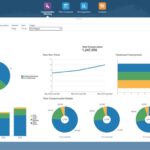Share this
In the dynamic world of small businesses, effective financial management is crucial for sustainable growth and profitability. With the right financial software, small businesses can streamline their accounting processes, manage expenses, forecast financial trends, and stay compliant with tax regulations. This guide explores the best financial software solutions available for small businesses, their features, benefits, and how to choose the right one for your needs.
Why Small Businesses Need Financial Software
Financial software for small business simplifies and automates various financial tasks, allowing business owners to focus on growth strategies. Here are some key reasons why investing in financial software is essential:
- Efficiency and Accuracy: Manual bookkeeping is prone to errors. Financial software automates calculations, reducing the risk of mistakes and saving time.
- Real-Time Financial Insights: Provides instant access to financial data, helping in making informed decisions.
- Expense Management: Tracks and categorizes expenses, ensuring better control over finances.
- Tax Compliance: Helps in preparing accurate tax returns and staying compliant with tax laws.
- Scalability: Adapts to the growing needs of your business without the need for significant overhauls.
Key Features to Look for in Financial Software
When selecting financial software for your small business, consider the following essential features:
- Invoicing and Billing: Automated invoicing, recurring billing, and payment reminders.
- Expense Tracking: Categorization and monitoring of expenses.
- Bank Reconciliation: Automated matching of bank transactions with accounting records.
- Financial Reporting: Generation of detailed financial reports like profit and loss statements, balance sheets, and cash flow statements.
- Inventory Management: Tracking of inventory levels, orders, and sales.
- Payroll Management: Calculation of salaries, taxes, and other deductions.
- Multi-Currency Support: Handling of transactions in different currencies.
- Integration Capabilities: Seamless integration with other tools like CRM, ERP, and e-commerce platforms.
- Cloud Accessibility: Access to financial data from anywhere, at any time.
- User-Friendliness: An intuitive interface that is easy to navigate.
Top Financial Software for Small Businesses
1. QuickBooks Online
Overview:
QuickBooks Online is a popular choice among small businesses due to its comprehensive features and user-friendly interface. It offers various plans tailored to different business needs.
Key Features:
- Automated Invoicing: Create and send professional invoices.
- Expense Tracking: Connects to bank accounts for easy expense tracking.
- Financial Reporting: Generates essential financial reports.
- Inventory Management: Tracks inventory in real-time.
- Payroll Services: Manages payroll and tax filings.
Benefits:
- Scalability: Suitable for both small and growing businesses.
- Cloud-Based: Accessible from any device with internet connectivity.
- Integrations: Connects with popular apps like PayPal, Shopify, and Square.
Pricing:
Starts at $25 per month with tiered pricing based on features.
2. Xero
Overview:
Xero is known for its robust accounting features and a strong emphasis on user experience. It is ideal for businesses that need comprehensive financial management.
Key Features:
- Invoicing: Customizable invoices and automated payment reminders.
- Bank Reconciliation: Streamlines bank transactions and reconciliations.
- Expense Management: Tracks expenses and allows receipt uploads.
- Project Management: Tracks project costs and profitability.
- Multi-Currency: Handles multiple currencies with real-time exchange rates.
Benefits:
- Ease of Use: Simple and intuitive interface.
- Mobile App: Full-featured mobile app for on-the-go access.
- Third-Party Integrations: Integrates with over 800 apps.
Pricing:
Starts at $13 per month with scalable plans.
3. FreshBooks
Overview:
FreshBooks focuses on simplicity and is ideal for service-based businesses that require efficient invoicing and time tracking.
Key Features:
- Invoicing: Easy creation of professional-looking invoices.
- Expense Tracking: Connects to bank accounts and credit cards for expense tracking.
- Time Tracking: Tracks billable hours and adds them to invoices.
- Reporting: Provides insights into profit margins and expenses.
- Project Management: Helps manage projects and collaborate with clients.
Benefits:
- User-Friendly: Designed with simplicity in mind.
- Customer Support: Known for excellent customer service.
- Automation: Automates recurring invoices and late payment reminders.
Pricing:
Starts at $17 per month.
4. Wave Accounting
Overview:
Wave Accounting offers free accounting software with robust features, making it an excellent choice for very small businesses or freelancers.
Key Features:
- Invoicing: Unlimited invoicing with customizable templates.
- Expense Tracking: Tracks expenses and manages receipts.
- Bank Reconciliation: Syncs with bank accounts for easy reconciliation.
- Financial Reports: Generates essential reports for insights.
- Payroll: Available as a paid add-on.
Benefits:
- Free: Core accounting features are free to use.
- Ease of Use: Simple and straightforward interface.
- Cloud-Based: Accessible from any internet-connected device.
Pricing:
Free for core accounting; payroll and payment processing are paid services.
5. Zoho Books
Overview:
Zoho Books is part of the Zoho suite, offering a range of features at an affordable price. It is ideal for small businesses that use other Zoho applications.
Key Features:
- Invoicing: Customizable invoices with automated reminders.
- Expense Tracking: Tracks expenses and integrates with bank feeds.
- Inventory Management: Manages inventory and tracks orders.
- Time Tracking: Tracks billable hours and project costs.
- Financial Reports: Comprehensive financial reporting.
Benefits:
- Integration: Seamlessly integrates with other Zoho products.
- Affordability: Competitive pricing for the features offered.
- Automation: Automates various accounting tasks.
Pricing:
Starts at $12 per month.
Choosing the Right Financial Software for Your Business
Selecting the right financial software depends on your business size, industry, and specific needs. Here are some tips to help you make an informed decision:
- Assess Your Needs: Identify the key features that your business requires, such as invoicing, expense tracking, or inventory management.
- Consider Your Budget: Determine how much you are willing to spend on financial software. Remember that some solutions offer free plans or trial periods.
- Evaluate Integration Options: Check if the software integrates with other tools and platforms you use, such as CRM or e-commerce systems.
- Look for Scalability: Choose software that can grow with your business, offering additional features as needed.
- Test Usability: Opt for software with a user-friendly interface and good customer support.
- Read Reviews: Look at user reviews and testimonials to gauge the software’s reliability and performance.
Future Trends in Financial Software for Small Business
As technology evolves, financial software continues to advance, offering more sophisticated tools and capabilities. Here are some trends to watch:
- Artificial Intelligence (AI): AI-driven tools for predictive analytics, fraud detection, and automated financial analysis.
- Blockchain: Enhanced security and transparency in financial transactions through blockchain technology.
- Mobile Solutions: Increased functionality in mobile apps for on-the-go financial management.
- Integration with Fintech: Greater integration with Fintech solutions for seamless financial operations.
- Data Analytics: Advanced data analytics for deeper insights into financial performance and trends.
Conclusion
Investing in the right financial software is crucial for the efficiency and growth of small businesses. From automated invoicing to real-time financial insights, these tools offer numerous benefits that can streamline financial management and drive business success. By assessing your business needs and exploring the features of various software options, you can find the ideal solution that meets your requirements and budget. Stay ahead of the curve by keeping an eye on emerging trends in financial software, ensuring your business continues to thrive in a competitive market.


